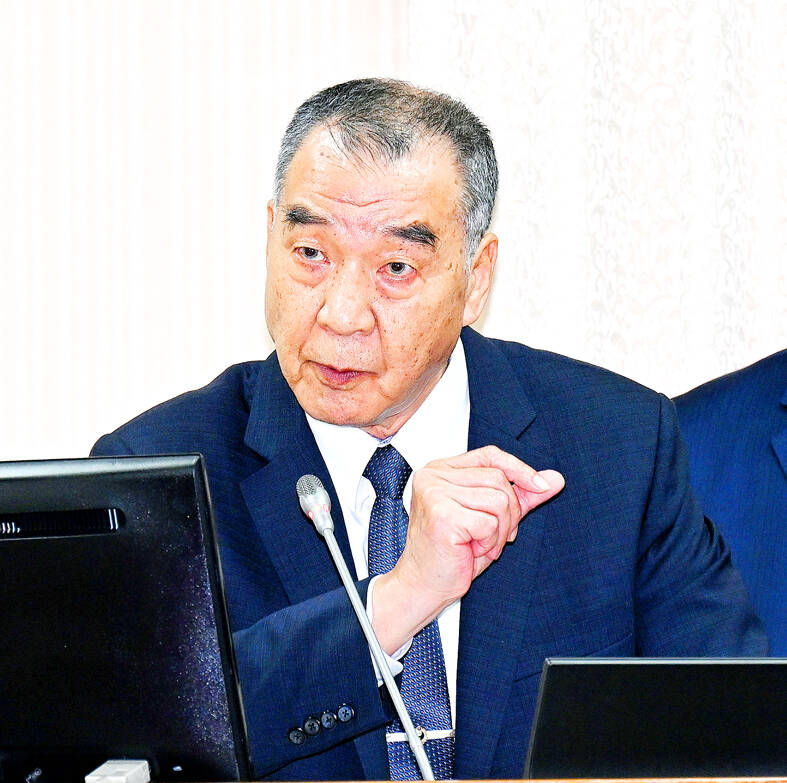Minister of National Defense Chiu Kuo-cheng (邱國正) on Tuesday confirmed that the ministry plans to purchase the second-generation National Advanced Surface-to-Air Missile System (NASAMS 2) from the US.
Speaking on the sidelines of a legislative session, Chiu said media reports about the acquisition were correct, but that the military had not yet received an official notification regarding a time frame for the purchase.
Chiu said the effectiveness of NASAMS 2 had been demonstrated by its performance in Ukraine, where US defense officials claim it has had a 100 percent success rate in intercepting Russian missiles.

Photo: Fang Pin-chao, Taipei Times
Chieh Chung (揭仲), an associate research fellow with the National Policy Foundation in Taipei, said that part of the NASAMS 2’s attractiveness is the system’s ability to use Link 16, a standardized military communications protocol providing tactical data links between NATO members.
NASAMS 2 can also be integrated with other systems as a highly adaptable mid-range air defense solution and improve engagement efficiency, he said.
An unnamed expert described NASAMS 2 as a powerful short to medium-range, ground-based air defense system that can protect against a variety of aerial threats, including drones, missiles, helicopters and planes within 40km to 50km.
The system integrates US-built MPQ-64 Sentinel air defense radar with multiple short and medium-range air defense missile systems, the expert said.
A separate military source said that the system Taiwan plans to acquire is a distributed and networked air defense system.
The source said that after an initial assessment, the system is expected to be used in combination with two air defense systems developed by the Chungshan Institute of Science and Technology.
Military expert Chen Kuo-ming (陳國銘) said that the system could be refitted into a medium-range air defense system and would likely be the first choice for repelling cruise missiles.

Nipah virus infection is to be officially listed as a category 5 notifiable infectious disease in Taiwan in March, while clinical treatment guidelines are being formulated, the Centers for Disease Control (CDC) said yesterday. With Nipah infections being reported in other countries and considering its relatively high fatality rate, the centers on Jan. 16 announced that it would be listed as a notifiable infectious disease to bolster the nation’s systematic early warning system and increase public awareness, the CDC said. Bangladesh reported four fatal cases last year in separate districts, with three linked to raw date palm sap consumption, CDC Epidemic Intelligence

Two Taiwanese prosecutors were questioned by Chinese security personnel at their hotel during a trip to China’s Henan Province this month, the Mainland Affairs Council (MAC) said yesterday. The officers had personal information on the prosecutors, including “when they were assigned to their posts, their work locations and job titles,” MAC Deputy Minister and spokesman Liang Wen-chieh (梁文傑) said. On top of asking about their agencies and positions, the officers also questioned the prosecutors about the Cross-Strait Joint Crime-Fighting and Judicial Mutual Assistance Agreement, a pact that serves as the framework for Taiwan-China cooperation on combating crime and providing judicial assistance, Liang

Reports of Taiwanese going missing, being detained or interrogated, or having their personal liberties restricted in China increased about fourfold annually last year, the Mainland Affairs Council (MAC) said yesterday. Last year, 221 Taiwanese who traveled to China were reported missing, were detained and interrogated, or otherwise had their personal freedom restricted, up from 55 the previous year, the council said. Reopening group tours to China would be risky, as it would leave travelers with no way to seek help through official channels after Beijing shut down dialogue between the associations tasked with handling cross-strait tourism, the MAC said. Taipei’s Taiwan Strait Tourism

SHIFT: Taiwan is evolving from a transit stop into a tourist destination, with more international travelers willing to spend on tours, dining and cultural activities Taiwan rose three places in the World Tourism Barometer to 36th globally in 2024, with international tourism revenue of US$10.028 billion, the Tourism Administration said on Monday. The UN Tourism Organization publication said that its focus has switched from whether a country has returned to pre-COVID-19 levels of tourism to the amount spent by a tourist during an overseas trip. The nation last year welcomed 8.57 million international tourists, about 9 percent more than in 2024, with most tourists coming from Japan, South Korea, and Hong Kong and Macau, all of which accounted for at least 1 million tourists each. During the first